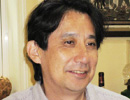Directory
Contemporary Asian Studies Cluster

| Name |
Ichirou TOMIYAMA Professor (Doctoral Program) itomiyam@mail.doshisha.ac.jp Researcher Database |
|---|---|
| Laboratory | Shikokan Building 265 (SK265) |
- ※
- Professor (Doctoral Program) also teaches the Master's Program.
Research Areas
Japanese History,
Okinawan Studies,
Cultural Studies
Message to students
At one stage I hoped to become an ecologist, or an animal doctor. At graduate school I majored in agro-economic history, and began to study rural communities in prewar Okinawa. In the course of this pursuit I kept coming across complex issues relating to Okinawa. As I tried to come to terms with the many questions of nation-state, diaspora, wartime experience, minority outlooks, global militarism, colonialism and gender that emerged from Okinawa, my methodological and disciplinary interests expanded, and I began to question the nature of scholarly inquiry itself. Today my research extends over a wide range from cultural studies to the history of ideas.
Perhaps I would have been better off tactfully insisting that these questions are outside my specialist field. But while willingly becoming engrossed in emerging questions, I pondered them in a situation where there was very little to guide me, and as a result, my research ended up crossing disciplinary boundaries. I am pleased that it ended up this way. My choices have exposed me to the joys of scholarly inquiry. For me, the most important thing is to become absorbed in the problem at hand, and to enjoy doing so.
I hope you will actively engross yourself in the questions that emerge from whatever you are studying. This applies not only to your academic work. It also demands an absolute refusal to label things as “not my business” simply on the basis of how you define your group affiliations. This also involves recognizing that the people and places you are studying do not exist in isolation from your own interests. Sometimes it can be painful to maintain this stance. At the same time, however, it will undoubtedly bring you great joy.
Thinking across borders does not mean lumping disparate places together on the basis of their commonalities. Rather, it is a process which entails both the pain and the joy of responding to questions that emerge disparately, and becoming caught up in those questions as one’s own concern. I believe that the academic system of disciplines, scholarly societies and so on exists not for the purposes of territorial division, but in order to keep this process. And to me, the term “global studies” is an expression of this concept.
I have recently become very fond of the following passage written by a certain biochemist reflecting on his own research: “The important thing was the question, not the answer. It was a matter of how to express the question.” Becoming absorbed in something entails a sequence whereby one question leads to the next in succession. Through an inundation of questions, our perception of the world becomes provisional and our vision opens up into the future. I believe this biochemist was entirely correct when he described research as “a machine that creates the future.”